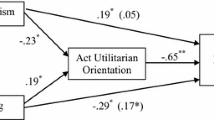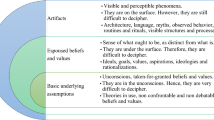Abstract
Despite an increase in international business ethics research in recent years, the number of studies focused on Latin America and China has been deficient. As trade among Pacific Rim nations increases, an understanding of the ethical beliefs of the people in this region of the world will become increasingly important. In the current study 208 respondents from Peru and China are queried about their ethical ideologies, firm practices, and commitment to organizational performance. The empirical results reveal that Chinese workers are more relativistic and less idealistic than their Peruvian counterparts. One explanation for the disparity between these two groups is likely the variation in collectivism that can be traced to different levels of importance across ingroups and outgroups. In addition to a summary of the results, future research directions and managerial implications are discussed.
Similar content being viewed by others
References
Alreck P., Settle R. 1995 The Survey Research Handbook, 2nd edition. Homewood, IL: Irwin.
Arruda M. 1997 Business Ethics in Latin America. Journal of Business Ethics, 16, 1597–1603
Ashforth B. E., Mael F. 1989 Social Identity Theory and the Organization. Academy of Management Review, 14(1), 20–39
Bhagat R. S., Kedia B. L., Harveston P. D., Triandis H. C. 2002 Cultural Variations in the Cross-Border Transfer of Organizational Knowledge: An Integrative Framework. Academy of Management Review, 27(2), 204–221
Cronbach L. J. 1951 Coefficient Alpha and the Internal Structure of Tests. Psychometrika, 16, 297–334
Ferrell O., Fraedrich J, Ferrell L. 2000 Business Ethics: Ethical Decision Making and Cases. Boston: Houghton Mifflin
Florey A., Harrison D. 2000 Responses to Informal Accommodation Requests from Employees with Disabilities: Multistudy Evidence on Willingness to Comply. Academy of Management Journal, 43, 224–233
Forsyth D. 1980 A Taxonomy of Ethical Ideologies. Journal of Personality and Social Psychology, 39(1), 175–184
Garten, J.: 2002, ‹Corporate Standards: Raise the Bar Around the World’, Business Week, May 13, 30
Hofstede, G.: 1980, Culture's Consequences: International Differences in Work-Related Values (Beverly Hills, CA, Sage)
Hofstede G. 1993 Cultural Constraints in Management Theories. Academy of Management Executive, 7, 81–94
Hofstede G. 1997 Cultures and Organizations: Software of the Mind. McGraw-Hill: New York
Hofstede G., Bond M. H. 1988 The Confucius Connection: From Cultural Roots to Economic Growth. Organizational Dynamics, 16(4), 5–21
Holt D., Ralston D., Terpstra R. 1994 Constraints on Capitalism in Russia: The Managerial Psyche. Social Infrastructure and Ideology. California Management Review, 36(3), 124–141
Hosmer L. 2000 It’s Time for Empirical Research in Business Ethics. Business Ethics Quarterly, 10(1), 233–242.
Husted B. 1999 Wealth, Culture, and Corruption. Journal of International Business Studies, 30(2), 339–360
Jackson T., David C., Deshpande S., Jones J., Joseph J., Lau K., Matsuno K., Nakano K., Park H., Kokoszko J., Taka, I. Yoshihara H. 2000 Making Ethical Judgements: A Cross-Cultural Management Study. Asia Pacific Journal of Management, 17, 443–472
Jones T. 1991 Ethical Decision Making by Individuals in Organizations: An Issue-Contingent Model. Academy of Management Review, 16(2), 366–395
Latin American News Digest, Peru, China Trade seen at $1.75 billion in 2004, December 13, 2004
Lee D., Pae J., Wong Y. 2001 A Model of Close Business Relationships in China (guanxi). European Journal of Marketing, 35, 51–65
Lenartowicz T., Johnson J. 2002 Comparing Managerial Values in Twelve Latin American Countries: An Exploratory Study. Management International Review, 42(3), 279–307
Lloso, A.: 2005, ‹Growing Chinese Presence in Latin America no Threat: Economic Growth, not Ideology, Motivates the Move across the Pacific Ocean’, Edmonton Journal, October 15, A19
Luo Y. 2002 Corruption and Organization in Asian Management Systems. Asia Pacific Journal of Management, 19, 405–422
Malhotra N. K., Agarwal J., Peterson M. (1996) Methodological Issues in Cross-Cultural Marketing Research: A State-of-the-Art Review. International Marketing Review, 13(5), 7–43
Marshall R. 2003 Building Trust Early: The Influence of First and Second Order Expectations on Trust in International Channels of Distribution. International Business Review, 12(4), 421–443
O’Fallon M., Butterfield K. 2005 A Review of the Empirical Ethical Decision-Making Literature: 1996–2003. Journal of Business Ethics, 59, 375–413
Olson B., Bao Y., Parayitam S. 2007 Strategic Decision Making within Chinese Firms: The Effects of Cognitive Diversity and Trust on Decision Outcomes. Journal of World Business, 42(1), 35–46
Podsakoff P. M., Organ D. W. 1986 Self-Reports in Organization Research: Problems and Prospects. Journal of Management, 12, 531–544
Puffer S., McCarthy D. 1995 Finding the Common Ground in Russian and American Business Ethics. California Management Review, 37(2), 29–46
Ralston D. A., Holt D. H., Terpstra, R. H., Kai-Cheng Y. 1997 The Impact of National Culture and Economic Ideology on Managerial Work Values: A Study of the United States, Russia, Japan, and China. Journal of International Business Studies, 28(1), 177–207
Rawwas M., Vitell S., Al-Khatib J. 1994 Consumer Ethics: The Possible Effects of Terrorism and Civil Unrest on the Ethical Values of Consumers. Journal of Business Ethics, 13, 223–231
Redfern K. 2005 The Influence of Industrialization of Ethical Ideology of Managers in the People’s Republic of China. Cross-Cultural Management, 12(2), 30–50
Rest, J.: 1986, Moral Development: Advances in Research and Theory (Praeger, New York)
Robertson C., Fadil P. 1999 Ethical Decision Making in Multinational Organizations: A Culture-Based Model. Journal of Business Ethics, 19, 385–392
Robertson C., Gilley K., Street M. 2003 The Relationship between Ethics and Firm Practices in Russia and The United States. Journal of World Business, 38, 375–384
Robertson C., Crittenden W. 2003 Mapping Moral Philosophies: Strategic Implications for Multinational Firms. Strategic Management Journal, 24, 385–392
Shaffer, M. A., Harrison, D. A., Gilley, K. M. 1999 Dimensions, Determinants, and Differences in Expatriate Adjustment. Journal of International Business Studies, 30, 557–581
Tjosvold D., Hui C., Law K. S. 2001 Constructive Conflict in China: Cooperative Conflict as a Bridge Between East and West. Journal of World Business, 36(2), 166–183
Transparency International: 2005, http://www.transpar ency.org
Treviño L. 1986 Ethical Decision Making in Organizations: A Person-Situation Interactionist Model. Academy of Management Review, 11, 601–617
Triandis, H. C.: 1995, Individualism and Collectivism (Boulder, CO, Westview)
Triandis H. C. 2004 The Many Dimensions of Culture. Academy of Management Executive, 18, 88–93
Trompenaars F. (1994) Riding the Waves of Culture. New York, NY: Irwin
Vitell S., Nwachukwu S., Barnes J. 1993 The Effects of Culture on Ethical Decision-Making: An Application of Hofstede’s Typology. Journal of Business Ethics 12, 753–760
Velazquez M. 2000 Globalization and the Failure of Ethics. Business Ethics Quarterly, 10, 343–352
Warren, D. E., Dunfree, T. W., Li, N. (2004) Social Exchange in China: The Double-Edged Sword of Guanxi. Journal of Business Ethics, 55, 355–372
Author information
Authors and Affiliations
Corresponding author
Rights and permissions
About this article
Cite this article
Robertson, C.J., Olson, B.J., Gilley, K.M. et al. A Cross-Cultural Comparison of Ethical Orientations and Willingness to Sacrifice Ethical Standards: China Versus Peru. J Bus Ethics 81, 413–425 (2008). https://doi.org/10.1007/s10551-007-9504-3
Received:
Accepted:
Published:
Issue Date:
DOI: https://doi.org/10.1007/s10551-007-9504-3




